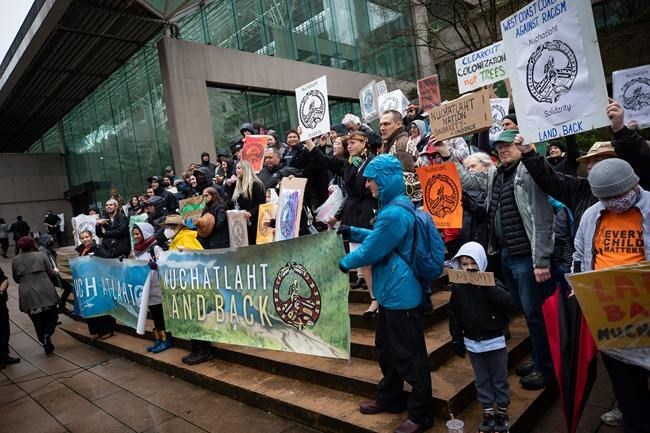VANCOUVER — The British Columbia government admits that members of the Nuchatlaht First Nation are descended from a historical Indigenous collective, but the lineage through a family of chiefs doesn't establish Aboriginal title, a provincial lawyer says.
Jeff Echols told a B.C. Supreme Court trial Tuesday that the province disputes the nation's claim to 230 square kilometres of land off Vancouver Island's west coast.
The "modern-day" Nuchatlaht draws its membership from a broader base of Indigenous Peoples than the "historical" Nuchatlaht did when the Crown claimed sovereignty over what's now B.C., he said, and the province plans to present evidence showing their ancestors weren't alone in using the land on Nootka Island.
Case law has established that Aboriginal title is not transferable, Echols said. The legal test would not allow the modern Nuchatlaht to assume the title of other historical Indigenous groups whose members joined or merged with them, he said.
The Nuchatlaht First Nation, which has about 160 registered members, claims the B.C. and federal governments have denied its rights by "effectively dispossessing" the nation of the Nootka Island land. The lawsuit asks the court for a declaration that would recognize their rights title and put a stop to logging in claim area.
Jack Woodward, a lawyer for the nation, told the court on Monday that expert evidence shows the Nuchatlaht were organized into a confederacy of sorts, with a number of groups who shared a summertime gathering place in the area.
The claim meets the test for Aboriginal title set out in the Supreme Court of Canada's landmark Tsilhqot'in decision in 2014, he said. That case recognized Tsilhqot'in title over a large part of their traditional territory in B.C.'s Interior.
The area the Nuchatlaht are claiming avoids any potential conflict with neighbouring nations, said Woodward, who also represented the Tsilhqot'in.
Echols also asserted Tuesday that the Nuchatlaht claim is too narrow in scope considering the complexity of modern Aboriginal rights litigation. He said he expects there will be disagreements between the nation and the province over what evidence and issues are deemed relevant to the trial, which is expected to last weeks.
The resolution of Indigenous rights claims through adversarial litigation is not the only option and it is not the province's preferred option, he said.
"But the litigation must proceed in a way that respects the rules of practice and fairness to all parties. It is particularly important that the court have the necessary evidentiary foundation for a fair determination of the case on its merits."
The nation's chief at the time the lawsuit was filed in 2017 said that the Nuchatlaht spent many frustrating years at the treaty table and working through other government processes trying to protect its lands and the health of its people.
Shortly before the end of Tuesday's hearing, Woodward said his client has asked him to apply to discontinue the proceeding against two of the three defendants, the federal government along with logging company Western Forest Products.
A lawyer for Western Forest Products had told the court that his client takes no position on whether the Nuchatlaht have Aboriginal title. But Geoff Plant urged the court to consider how a declaration recognizing its rights would affect third parties.
Western Forest Products has provincially approved logging tenures in the claim area on Nootka Island. Plant said the lawsuit, as it's currently structured, is "incapable of fully addressing the rights of third parties and the public interest."
If Nuchatlaht rights and title over the area are proven, Plant said the best way to achieve reconciliation would be for the court to suspend making any declaration to allow time for his client's interests to be taken into account.
A lawyer for the federal government said Tuesday it intends to "maintain a minimal role, given that there is no relief sought against the federal Crown."
This report by The Canadian Press was first published March 22, 2022.
Brenna Owen, The Canadian Press



